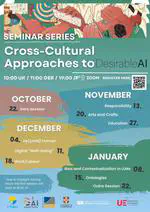AI and Health
 Photo by julien Tromeur on Unsplash
Photo by julien Tromeur on UnsplashThis cluster focuses on the philosophical and ethical issues in using AI in health (broadly construed). The integration of artificial intelligence (AI) into health care introduces significant ethical and philosophical challenges, as it transforms how care is delivered, decisions are made, and responsibilities are distributed. AI technologies like diagnostic algorithms, robotic surgeries, and predictive analytics hold immense potential to improve patient outcomes, but they also pose questions about bias, fairness, and the human dimension of care.
One prominent ethical concern is the issue of bias and fairness. AI systems, such as those used in diagnostic imaging or disease prediction, are trained on large datasets that may not adequately represent diverse populations. For example, a widely used dermatology AI system was found to perform poorly on patients with darker skintones because its training data predominantly featured lighter-skinned individuals.This raises questions about how equitable these technologies are and whether they might inadvertently exacerbate health disparities. Addressing this issue requires careful scrutiny of training data and ongoing evaluation of AI performance across different demographic groups. Another ethical challenge is privacy and data security.AI systems like IBM Watson for Oncology and Google’s DeepMind rely on vast amounts of patient data to generate insights. While this data can improve diagnoses and treatment recommendations, it also poses risks of misuse or unauthorized access. For instance, when DeepMind partnered with the UK’s National HealthService (NHS) to develop an AI tool for kidney disease detection, the project faced criticism for improperly accessing patient data without adequate consent. This incident underscores the need for robust safeguards to protect sensitive health information while ensuring that patients are fully informed about how their data isused. Philosophically, the use of AI in health care challenges traditional notions of agency and responsibility. For example, autonomous robotic surgeons, such as theda Vinci Surgical System, are increasingly performing complex procedures with minimal human intervention. While these systems can enhance precision, they also blur the lines of accountability. If an AI-driven surgical robot makes an error that harms a patient, who should be held responsible—the manufacturer, the programmer, or the supervising surgeon? This raises profound questions about the distribution of moral and legal responsibility in a health care system increasingly reliant on autonomous technologies. Finally, the dehumanization of care is a concernas AI takes on roles traditionally filled by humans. Chatbots like Babylon Health areused to triage patients or provide medical advice, but their lack of empathy andpersonal connection can make patients feel alienated. This raises philosophical questions about what it means to provide “care” and whether human interaction is anecessary component of healing. While AI can optimize efficiency, it cannot replicate the compassion and emotional understanding that many patients value in their interactions with health care providers.
Research Questions
- Should AI systems provide explainable results, even if it means reducing accuracy?
- What level of understanding is necessary for health care professionals and patients to trust AI systems?
- Could over-reliance on AI erode the empathy and compassion inherent in human care?
- Does use of AI in medicine foster epistemic injustice in various forms?
- How should responsibility for decisions made by AI systems be distributed between developers, health care providers, and patients?
- Do patients fully understand the role AI plays in their care? And does this matter?
- How can health care providers ensure meaningful consent when using AI-driven diagnostics or treatments?
- Will the benefits of AI-driven health care be equitably distributed, or will they widen existing gaps?
- Should there be regulatory frameworks for addressing AI errors in health care?
- How do biases in training data and algorithms exacerbate health care disparities?
Associated Researchers
- Lily Frank
- Philip Nickel
- Matthew Dennis
- Filippo Santoni de Sio
- Flor Pasturino


